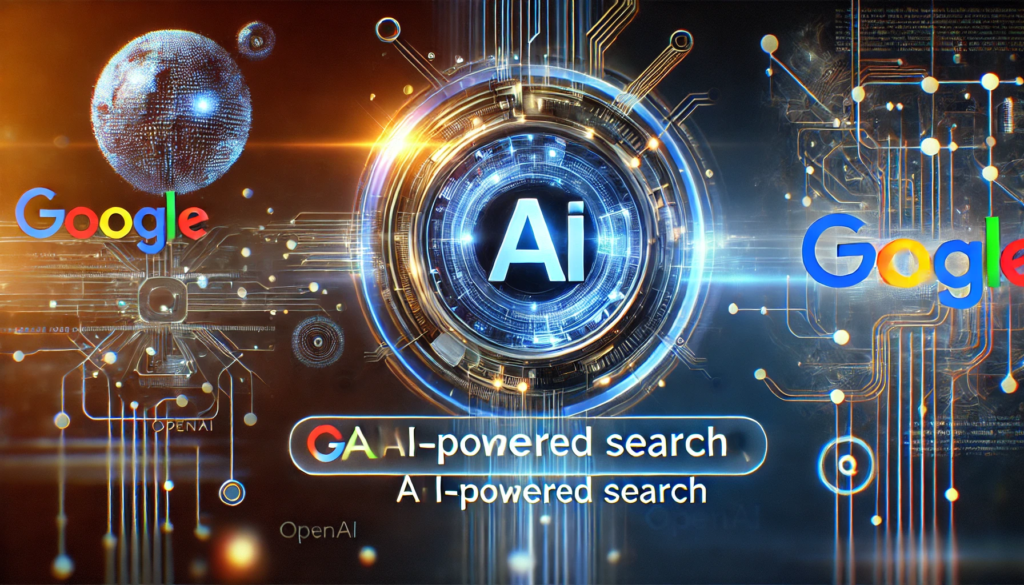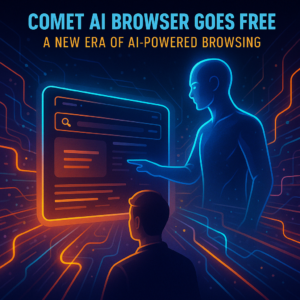OpenAI’s SearchGPT: Revolutionizing AI-Powered Search and Its Implications

SearchGPT, OpenAI's prototype, aims to revolutionize AI-powered search and challenge Google's dominance in web navigation.
- How does SearchGPT aim to transform the landscape of AI-powered search?
- What potential impact could SearchGPT have on Google’s dominance in web navigation?
- What are the future implications of integrating AI with real-time web data for search engines?
In a significant stride towards integrating artificial intelligence with everyday web searches, OpenAI has announced the prototype of SearchGPT. This innovative AI search feature aims to combine the robust capabilities of OpenAI’s models with real-time information from the web to provide users with fast, accurate, and source-cited answers. As this technology begins its rollout to a select group of users and publishers, it’s crucial to explore the potential impacts and future scenarios, particularly considering its possible repercussions on established search engines like Google. For the full announcement, visit the OpenAI website.
The Promise of SearchGPT
SearchGPT is designed to address the often laborious process of finding relevant information on the web. Traditional search engines frequently require users to sift through multiple pages and refine their queries to get precise results. SearchGPT, on the other hand, aims to streamline this process by delivering direct, conversational answers with clear links to the sources of the information. This approach saves time and enhances the user experience by providing a more intuitive and interactive method of obtaining information.
Enhancing the User Experience
The prototype is built to give users an answer quickly and directly, leveraging up-to-date information from the web. Unlike traditional search engines that list a series of links, SearchGPT provides responses akin to conversing with a knowledgeable person, allowing for follow-up questions that build on shared context. This conversational capability is a game-changer, as it offers a more natural and efficient way to conduct searches, potentially redefining how we interact with the internet.
Partnering with Publishers
One of the standout features of SearchGPT is its commitment to working with publishers and creators. OpenAI has emphasized its goal of fostering a thriving ecosystem where high-quality content is highlighted and easily accessible. By prominently citing and linking to publishers in search results, SearchGPT ensures that users are aware of their information sources, thus supporting the credibility and reliability of the answers provided.
Nicholas Thompson, CEO of The Atlantic, aptly summarized this approach: “AI search is going to become one of the key ways that people navigate the internet, and it’s crucial, in these early days, that the technology is built in a way that values, respects, and protects journalism and publishers.”
Publisher Control and Feedback
OpenAI’s SearchGPT is not just about delivering accurate search results but also about providing publishers with control over how their content appears in search results. Publishers can manage their visibility and engagement with SearchGPT through newly introduced controls, ensuring a symbiotic relationship between AI-powered search and content providers. Furthermore, OpenAI is actively seeking feedback from publishers to refine and enhance the user experience continually.
Robert Thomson, Chief Executive of News Corp, highlighted the importance of this relationship: “For AI-powered search to be effective, it must be founded on the highest-quality, most reliable information furnished by trusted sources. The relationship between technology and content must be symbiotic, and provenance must be protected.”
Implications for the Future
The introduction of SearchGPT has far-reaching implications for the future of search engines and the broader digital landscape. Here are several key points to consider:
- Impact on Traditional Search Engines: The development of SearchGPT poses a significant challenge to traditional search engines like Google. Google’s dominance in the search engine market has been largely uncontested for years, but the introduction of an AI-powered search tool that provides direct, conversational answers could disrupt this hegemony. If SearchGPT proves successful, it could lead to a shift in user preferences towards AI-driven search methods.
- User Behavior and Expectations: As users become accustomed to the conversational capabilities of SearchGPT, their expectations for how search engines should function will evolve. The demand for faster, more accurate, and contextually relevant answers will likely increase, pushing traditional search engines to innovate and adapt to maintain their user base.
- Monetization and Advertising: Traditional search engines like Google rely heavily on advertising revenue. The integration of AI in search could alter the landscape of online advertising. If SearchGPT’s model of providing direct answers becomes the norm, advertisers may need to find new ways to reach their audiences, potentially leading to a transformation in digital marketing strategies.
- Quality of Information: With SearchGPT’s emphasis on sourcing information from reputable publishers and providing clear attribution, the quality of information available to users is likely to improve. This approach can help combat the spread of misinformation and fake news, fostering a more informed public.
- Ethical and Privacy Considerations: As AI becomes more integrated into search technologies, ethical considerations around data privacy and the potential for bias in AI-generated responses will become increasingly important. OpenAI’s commitment to transparency and collaboration with publishers is a positive step, but ongoing vigilance and regulation will be necessary to ensure these technologies are used responsibly.
Potential Challenges
While the prospects for SearchGPT are promising, several challenges must be addressed to ensure its success and broader acceptance:
- Accuracy and Reliability: Ensuring the accuracy and reliability of AI-generated responses is paramount. While SearchGPT aims to provide clear links to sources, the AI models must be continuously trained and updated to avoid errors and biases in the information provided.
- Adoption and Integration: Encouraging users and publishers to adopt and integrate this new technology may require significant effort. Building trust and demonstrating the tangible benefits of SearchGPT will be critical to its widespread adoption.
- Competition and Market Dynamics: The entry of SearchGPT into the market will likely trigger competitive responses from established search engines. This competition could drive innovation but may also lead to market fragmentation if multiple competing AI search tools emerge.
The Road Ahead
The launch of OpenAI’s SearchGPT prototype marks a significant milestone in the evolution of AI-powered search technology. By combining the strengths of AI models with real-time web information, SearchGPT promises to deliver faster, more accurate, and contextually relevant answers. This innovation has the potential to disrupt traditional search engines, alter user behavior, and transform the digital marketing landscape.
As SearchGPT continues to develop and integrate user and publisher feedback, its success will depend on its ability to maintain high standards of accuracy, reliability, and ethical use. The future of search is undoubtedly moving towards AI, and SearchGPT is at the forefront of this revolution. To read the full announcement, visit the OpenAI website.




